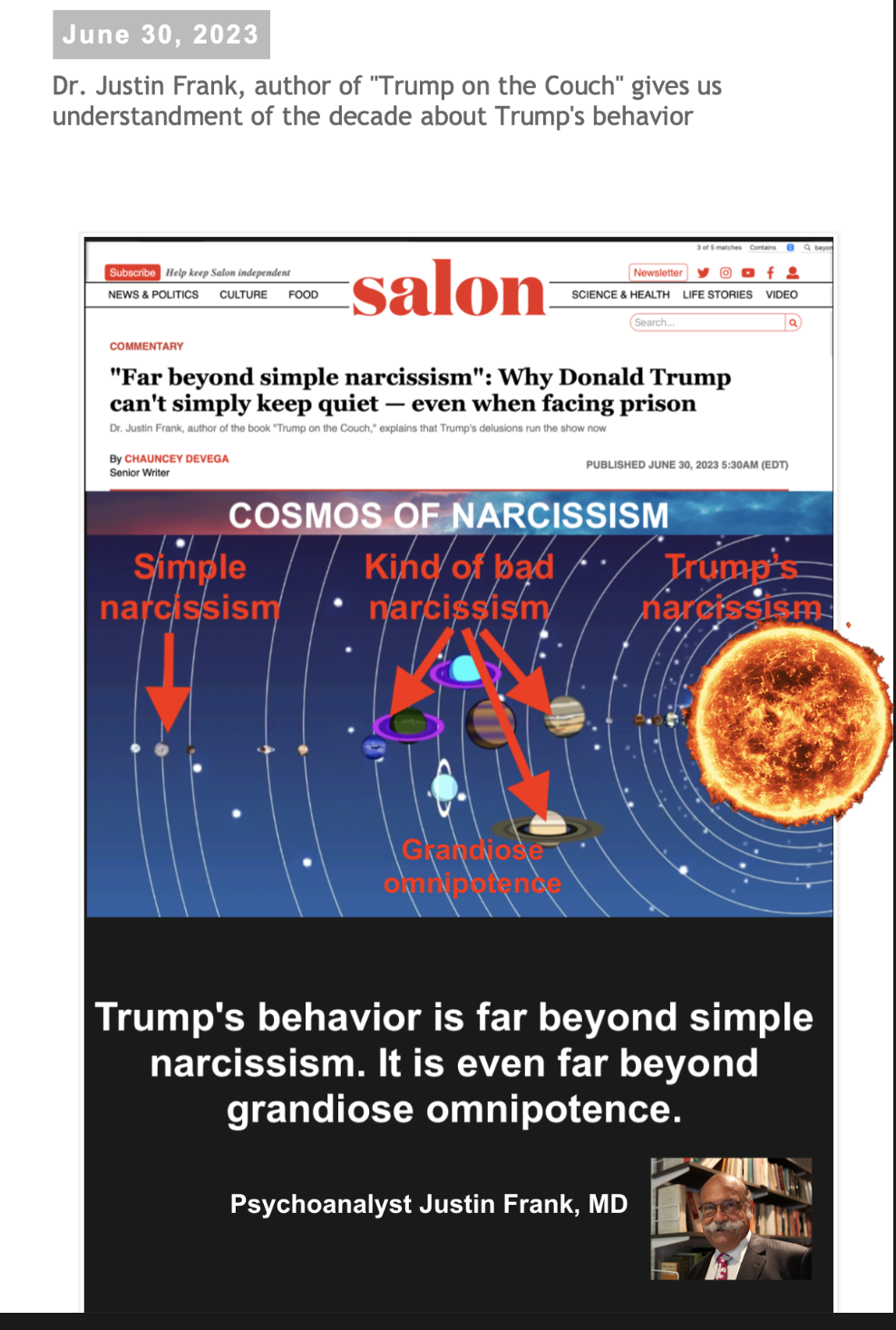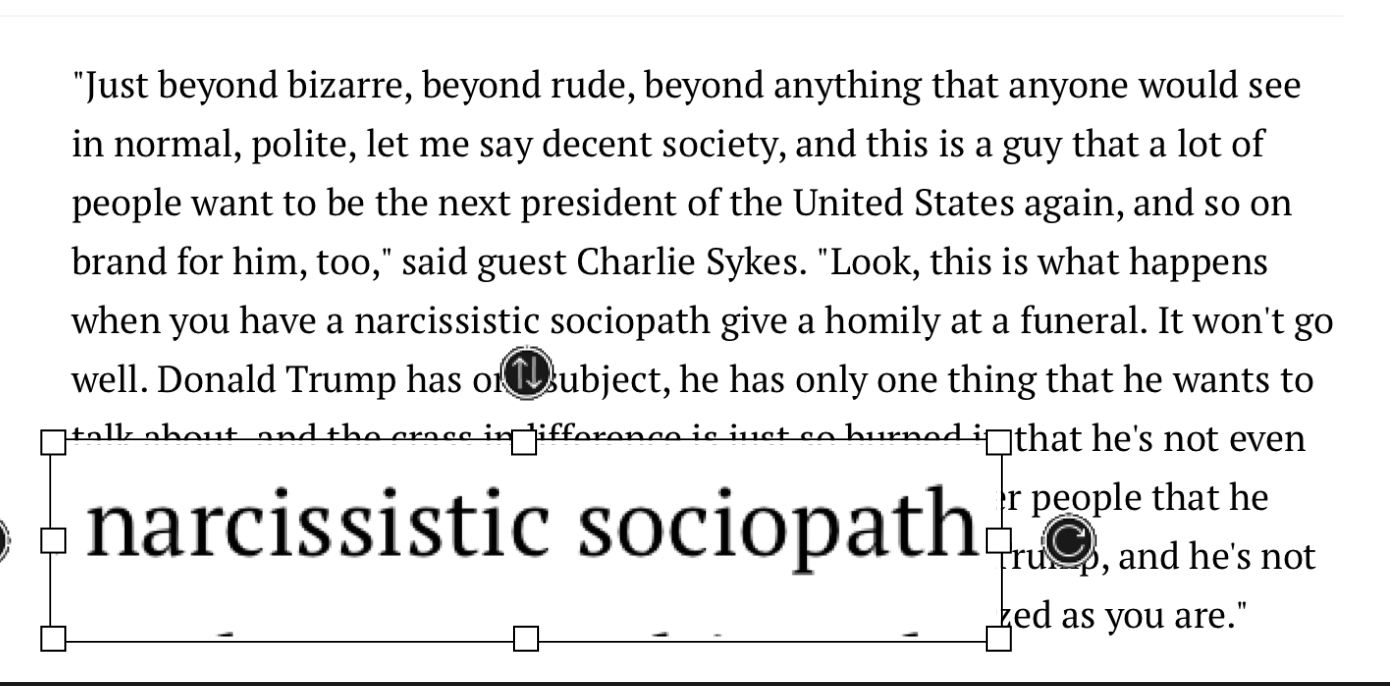By Hal Brown, MSW, Retired psychotherapistChauncey DeVega once again has provided a form for some of the nation's top mental health professionals to explain in depth the psychopathology of Donald Trump. Today's Salon column is titled on the main page "Digging his hole: Trump can't shut up" and titled in the article itself
He shares emails from both Justin Frank, MD, the psychoanalyst who wrote "Trump on the Couch" and Lance Dodes, MD, a retired assistant clinical professor of psychiatry at Harvard Medical School and a training and supervising analyst emeritus at the Boston Psychoanalytic Society and Institute. I recommend you reading the short and to the point Franks and Dodes emails in the Chauncey DeVega column.
Whether one is a distinguished mental health professional like Frank or Dodes or a state university clinical social work graduate who, in a past life ran a small community mental health center, and now blogs about Trump's dangerous psychopathology (like me), we find ourself trying to explain behavior so far beyond the normal abnormal it is difficult to avoid coming across as hyperbolic.
I think I can speak for not only Justin Frank and Lance Dodes, but also for Chauncey DeVega who as far as I'm concerned has earned himself an honorary doctorate in clinical psychology (or Trumplogy, if you will) saying that we don't want to sound like we're exaggerating about how pathological Trump is.
DeVega describes his own frustration, which I share:
For those of us, myself included, who have direct experience with sociopaths and other such dangerous people, living through the Age of Trump and trying to warn the American people about the disaster has been and continues to be remarkably frustrating and exhausting. For most of the Age of Trump, people said we had "Trump Derangement Syndrome" when we were just telling an uncomfortable and unpopular truth.
Psychotherapists and well informed non-therapists like DeVega, and notably George Conway, were accused by Trump supporters of suffering from a made-up mental illness, Trump derangement syndrome.
In fact, way back in 2017 mental health professionals tried to warn about Trump.
Clinical psychologist John Gartner, founder of Duty To Warn, was (as far as I know) the first expert to publicize the rationale for diagnosing Trump as a malignant narcissist. This was way back in 2017 and was published in USA Today:
The best seller "
The Dangerous Case of Donald Trump" edited by forensic psychiatrist Bandy X. Lee, was also published in 2017. The book had
essays from 27 mental health professionals including John Gartner. It described the "clear and present danger" that Trump's psychopathology posed to the "nation and individual well being". Read table of contents here.
I don't think any of the warnings published by experts about Trump since 2017 were hyperbolic.
I don't think I was stretching it to write in February of 2020 about adding a new diagnosis to the psychiatric manual to cover the highly unusual Trump diagnosis (
read here). In fact, I think it was a mistake not to include the diagnosis of
malignant narcissism when it was originally defined by Erich Fromm and others.
 |
| Click above to read my Daily Kos article |
In that story, which I posted on Daily Kos, I cited a Chauncey DeVega interview with Justin Frank: "On a fundamental level, Donald Trump does not believe in America" which used one of the well known photos of Trump hugging the American flag.
Addendum:
While I want what I write in a serious vein to be taken seriously, I admit I am sometimes reduced to blogging snarky commentary and pictures of that flag hugging. I found it too hard for me to resist modifying them:
 |
Top caption is "clinging to flag and anchor about
to sink" and bottom goes with this blog. |
Further reading:
Excerpts:
Summary: Researchers analyze the language of dictators and hate groups, uncovering a common use of dehumanizing metaphors to fuel hatred. Such metaphors ‘switch on’ neural pathways in the brain, bypassing higher cognitive reasoning centers and steering focus towards certain ideas.
These mental patterns can become entrenched over time, making it challenging for individuals to revise their views even in the face of contradicting evidence.
The research underscores the potential dangers posed by such language, including the escalation of violence and political instability.
Not an optimistic conclusion:
What can be done?
Is there anything we can do to protect ourselves from the power of lies? According to Danesi, the best thing we can do is to understand the metaphors of the other party, and to examine one’s own metaphors.
However, history and science tells us that it is unlikely to work – research shows that once a lie is accepted as believable, the brain becomes more susceptible to subsequent lying.































